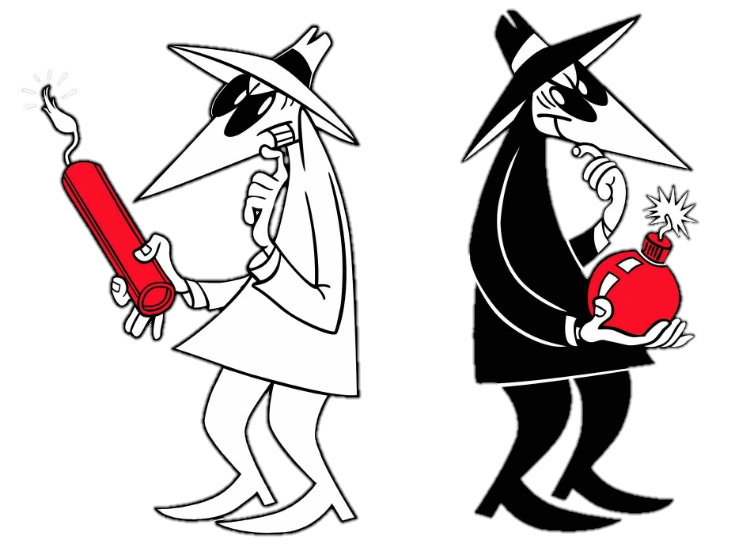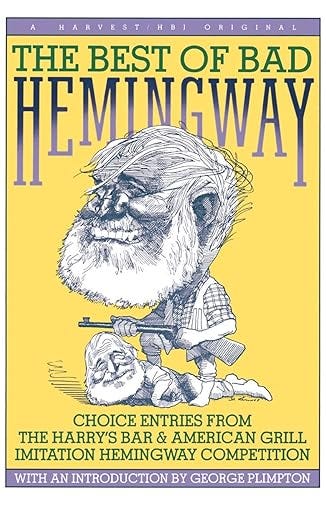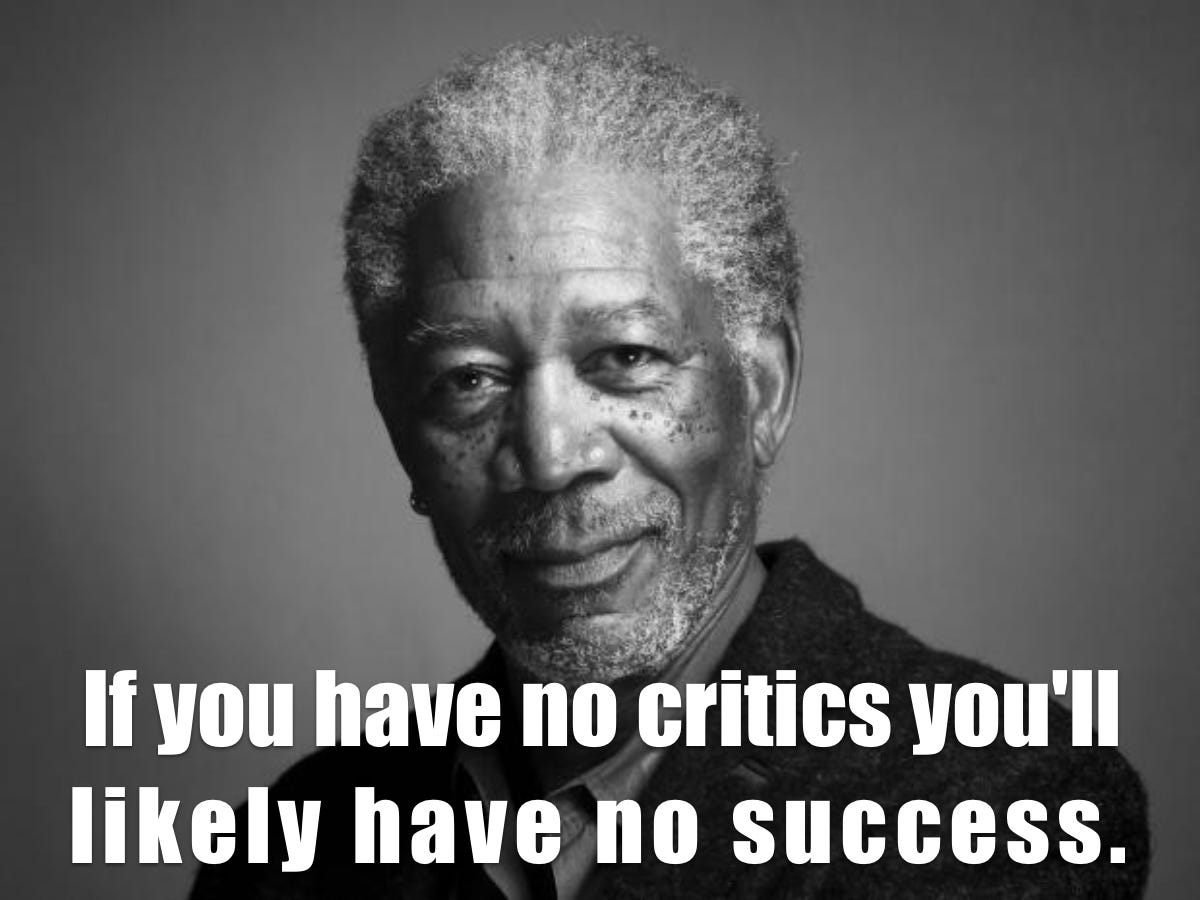Let’s try an experiment. Read the following quote by Morgan Freeman.
When you read it, did you hear Morgan Freeman’s distinctive baritone? Likely. There are memes all over the internet that ask you that very same question. It’s the natural outcome of having such a well-known voice and style.
But, as you may have guessed, that’s not actually a Morgan Freeman quote. It’s from Malcolm X. (And if you try to say it now in Malcolm X’s voice, you may find yourself actually borrowing Denzel Washington's voice in playing Malcolm X. “We didn’t land on Plymouth Rock: Plymouth Rock landed on us.”
So we could say I borrowed Morgan Freeman’s voice for this little thought experiment. Or nearer the mark would be to say I appropriated it. But to be truthful, I stole it. I stole Freeman’s likability, his air of authority, professionalism, and integrity. With Morgan Freeman, such antics are usually in the name of fun, but reassigning attribution of quotes to someone with more authority or a wider audience is endemic on the internet. Figures from Thomas Jefferson to Kurt Vonnegut have been misappropriated in this fashion. There have been a rash of pronouncements supposedly by the new pope that never passed his lips. I’m probably not telling you anything new here.
But now here’s an honest-god-quote from The Coming Wave: Technology, Power, and the Twenty-first Century's Greatest Dilemma, a recent book by AI pioneer Mustafa Suleyman:
“When GPT-4 launched in March 2023, results were again impressive. As with its predecessors, you can ask GPT-4 to compose poetry in the style of Enily Dickensen and it obliges; ask it it to pick up from a random snippet of The Lord of the Rings and you are suddenly reading a plausible imitation of Tolkien…”
(Particularly interesting here is the word “obliges.” Chat GPT could hardly say no. Free will is not yet an option with this package).
. As the internet created infinite information, AI is meant to supply the vessel of infinite attention. Just as Huxley’s The Doors of Perception pointed out, one of the brain’s functions is to close off too much information, to filter the hundreds of stimuli that assault our attention every moment.
I well remember the computer system installed for the hotel bar I worked at back in the stone age of the 1980s. It was immensely cumbersome to use because it was meant to capture an insane amount of information, such as exactly how many White Russians we served every day. It was meant to grease the wheels of inventory capture. The problem? No one had the time to review and analyze all this data, to turn data onto information.
I’m sure the minions of the NSA have the same complaint: its world-spanning electronic snoops create far too much information for analysts to digest. They must long for the days of spy vs. spy.

This same conundrum ushered AI into existence: unlimited informational resources is its raison d’etre. It shrinks that sea of information down to manageable size for our attention spans: think of the AI over-view of Google, or Amazon’s AI digests of reviews.
Even AI’s ability to mimic writing or artistic styles says “Look, no one can read all those Steven King novels—let me combine them into one in the same style—they’re all the same damn book anyway. Let me capture the essential style, the voice in a bottle. Now you can read King’s Little House on the Prairie. What fun!”
You can ask AI to compose a poem in the style of Dickensen or a story in the style of Hemingway. Easy peasy. What AI cannot do is write a story in its own voice, It hasn’t got one.
ChatGPT is a very expensive large language parrot. It lives in the past, because it only has the past, what has already been written, to fall back on.
It’s a patten-finder that throws words against the wall like spaghetti as it weighs the frequency with which those words have been organized by millions of humans over thousands of years. It’s SEO on steroids. A popularity contest. It’s a recipe for stultification. It can’t weigh right or wrong, harmonious or in-, only the loudest voice in the world-wide room.
“Style” and imitation” in the above quote from Suleyman are loaded terms. He’s not talking so gleefully about some circus trick here, (though he may think it) he’s actually getting at the essence of writing, what sets Thomas Mann apart from the man in the street: the elusive author’s voice.
At the heart of voice and accent is word choice, sentence length, rhythm—pattern. The science of finding that pattern is nothing new. Stylometry, the statistical analysis of texts for attribution—who really wrote the Bible, or Shakespeare’s plays—has been around for over a century.
Computers took up the hunt as early as the 1960s.
The Reverend A.Q. Morton sicced them on St. Paul’s Epistles to find out that they had actually been written by six different authors. His method was called into question when it also found that James Joyce’s Ulysses was penned by five different authors, none of them Joyce.
AI is just the souped-up version. What generative AI does best is detect patterns. It’s a one-trick pony. It does this through weighting and scaling, the LARGE in large lanaguage model means scaling up the raw computational power by daisy-chaining super-computers together—and by scraping the English language internet clean of all its contents.
So if you’re lifting a writer’s style, you’re lifting their voice, their fingerprint, that thing which makes them unique. Some traditional cultures are reputed to believe that photographs steal the subject’s soul. I’m here to tell you unequivocally that Chatbots steal a writer’s voice.
That’s not to say that imitation can’t be executed in a light-hearted, harmless way. The International Imitation Hemingway Competition was for many years a half satire, half tribute exercise in which writers were encouraged to write a really good page of really bad Hemingway, imitating his inimitable style. It even produced a couple of thoroughly risible anthologies. And everyone knows about the Bulwer-Lytton contest, now sadly retired, inspired by the author best remembered for the phrase “It was a dark and stormy night.” This was last year’s grand winner, by Joel Phillips, West Trenton, NJ:
Mrs. Higgins’ body was found in the pantry, bludgeoned with a potato ricer and lying atop a fifty-pound sack of Yukon golds, her favorite for making gnocchi, though some people consider them too moist for this purpose.

But need I point out that both the authors mentioned are long since dead, not in need of their voices except perhaps for seances, and that their imitators are other writers, actual warm-bodied human beings, not algorithmic pickpockets?
And need I point out that these artificial vampires can feast on the blood of the living, on Stephen King, Coleen Hoover, Jon Grisham, Dan Brown, even Salman Rushdie, Amor Towles, or Barbara Kingsolver, as well as every nameless author including yours truly?
(Yes, I checked, all three of my Sherlock Holmes novels have been fed into its slavering jaws. I can take comfort in the fact that I stole Dr. Watson’s voice for those, so they don’t have my authentic voice—yet.)
I, the writer, cannot protect my voice (recent court rulings have put the kibosh on that attempt, deciding in their less-than wisdom that using copyrighted material to train AI models is “fair use.”) Only you, the reader, can do that. Listen to the voice of one crying in the wilderness of cyberspace: choose 100% humanity. Accept no substitutes.


No comments yet
So leave a comment already
Thanks a million!